高中英语必修2 Unit 1 Cultural relics Grammar 课件 (共20张PPT)
文档属性
| 名称 | 高中英语必修2 Unit 1 Cultural relics Grammar 课件 (共20张PPT) |
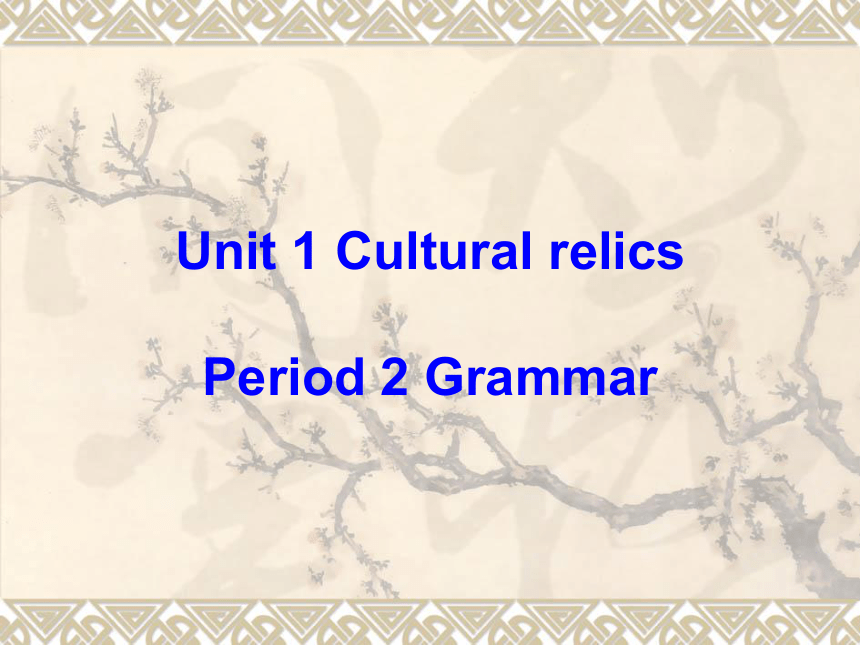
|
|
| 格式 | zip | ||
| 文件大小 | 118.9KB | ||
| 资源类型 | 教案 | ||
| 版本资源 | 人教版(新课程标准) | ||
| 科目 | 英语 | ||
| 更新时间 | 2016-07-12 00:00:00 | ||
图片预览

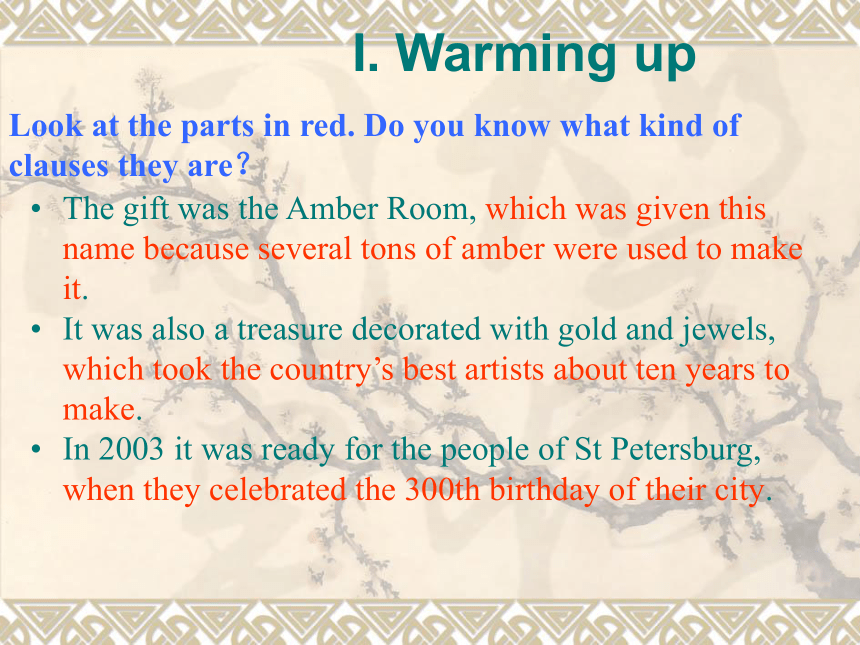
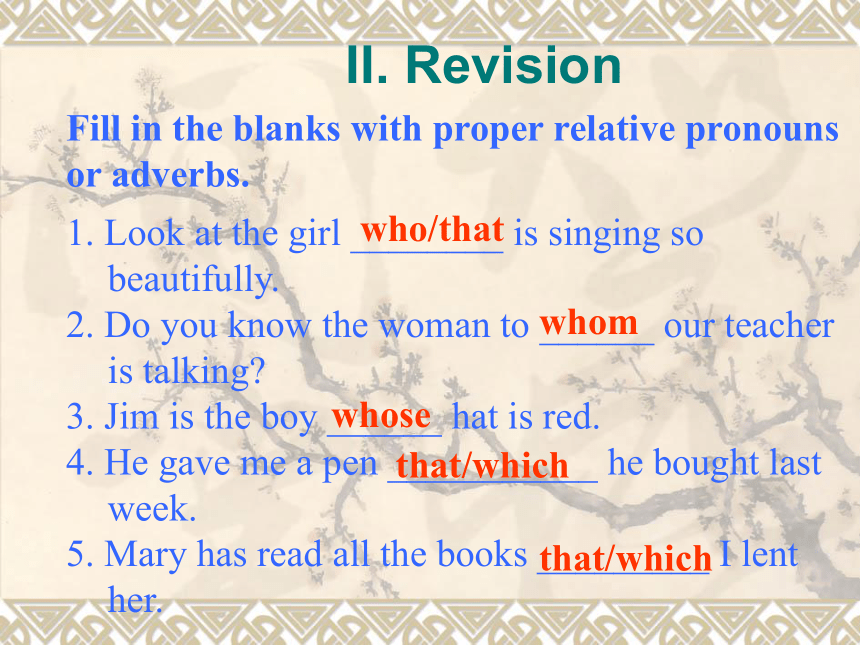
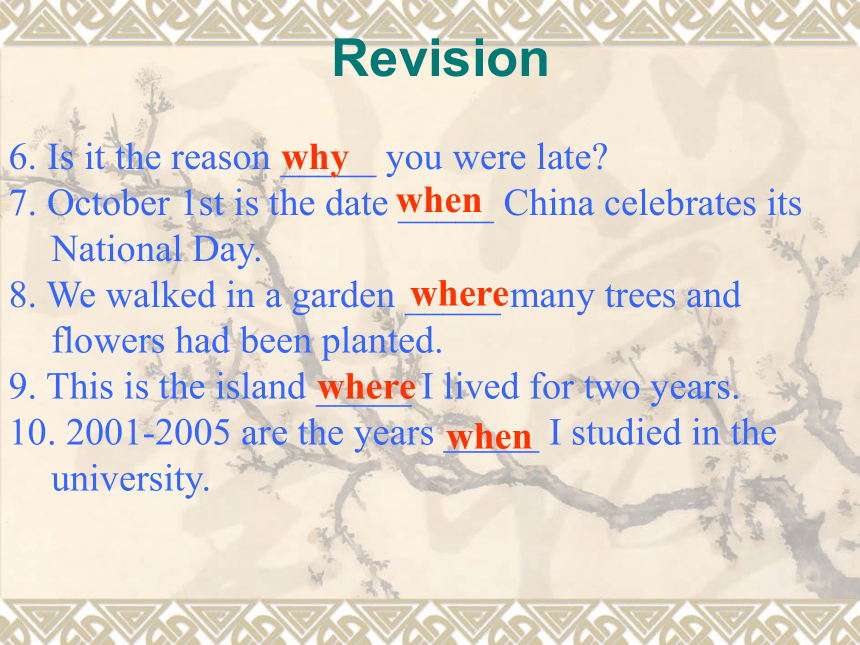
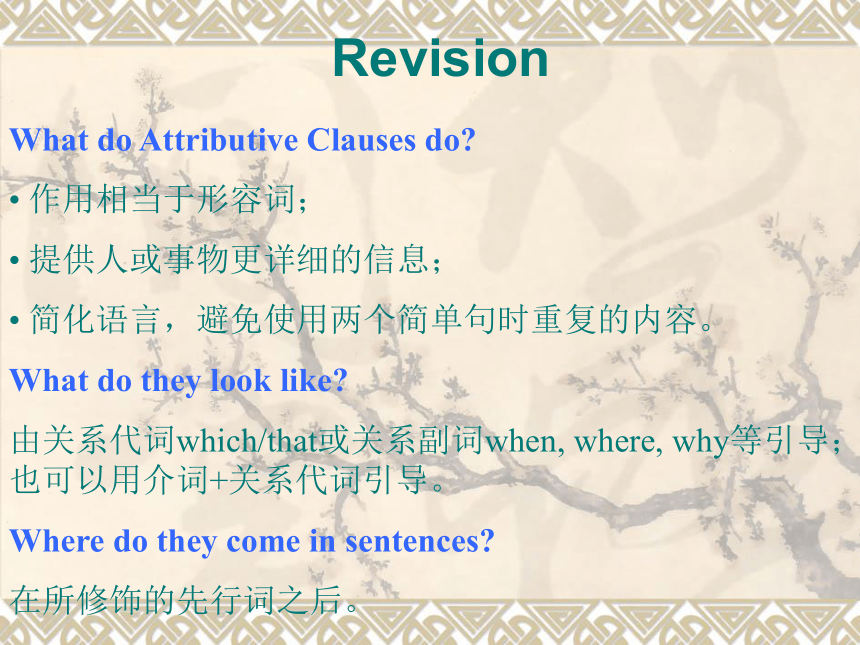
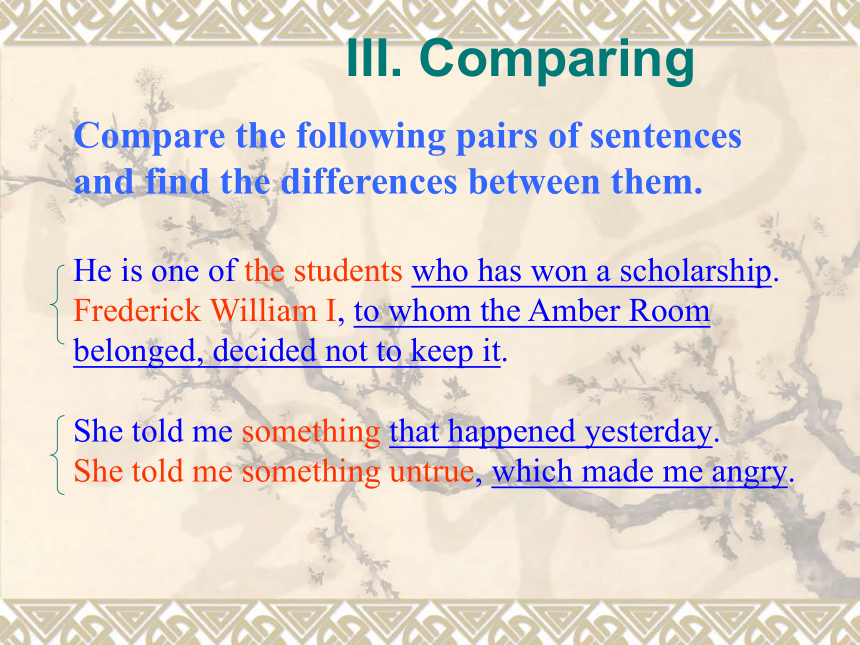
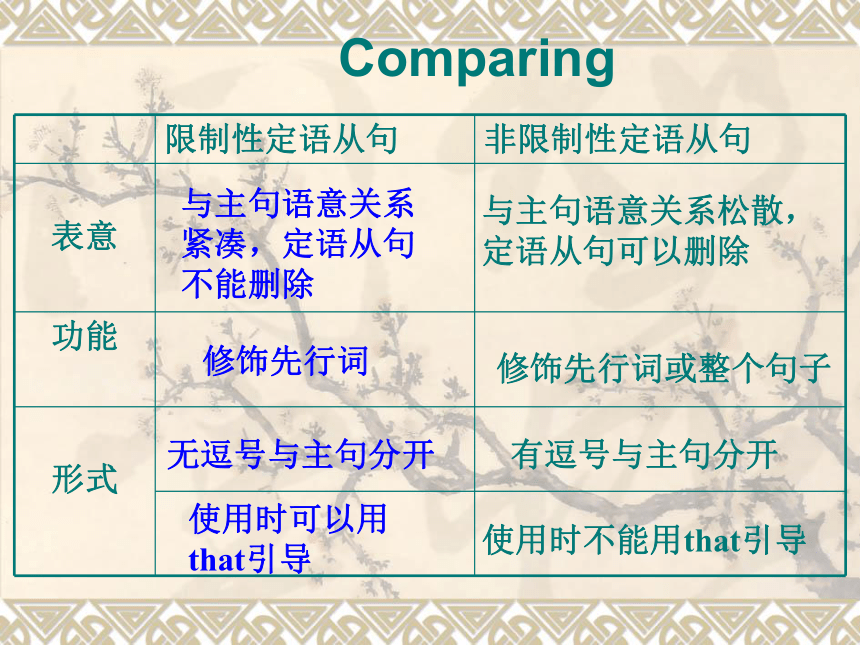
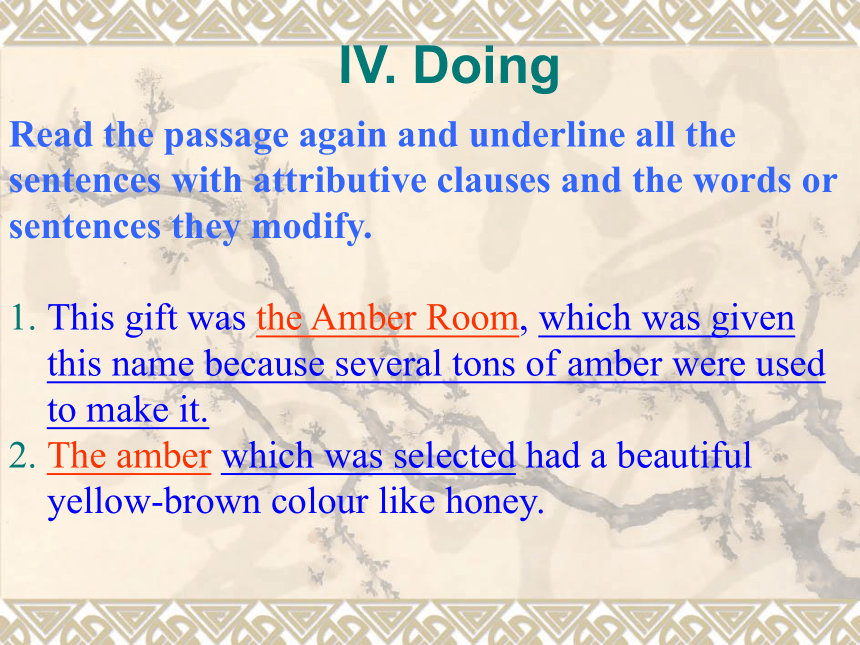
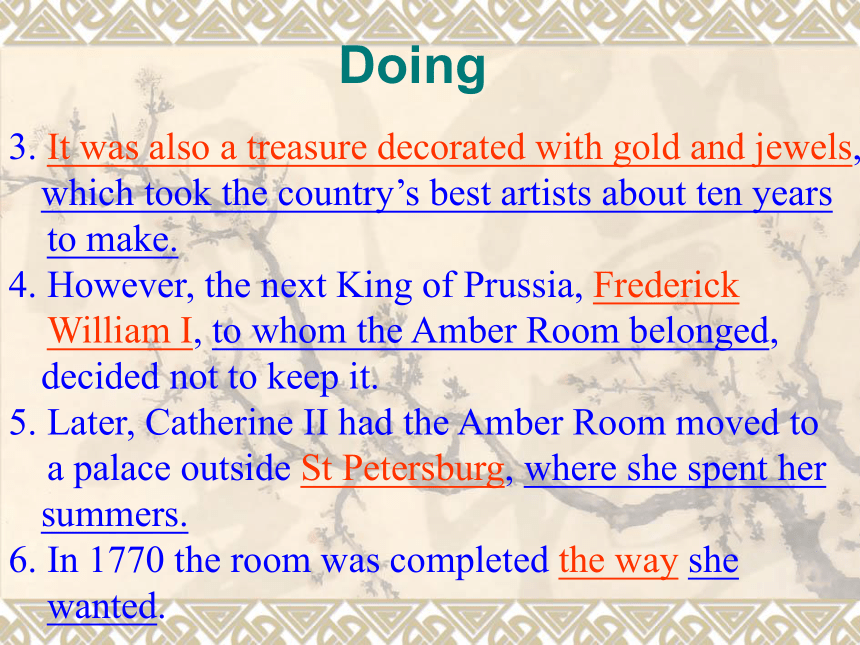
文档简介
课件20张PPT。Unit 1 Cultural relics
Period 2 Grammar
The gift was the Amber Room, which was given this name because several tons of amber were used to make it.
It was also a treasure decorated with gold and jewels, which took the country’s best artists about ten years to make.
In 2003 it was ready for the people of St Petersburg, when they celebrated the 300th birthday of their city.
I. Warming upLook at the parts in red. Do you know what kind of clauses they are?
1. Look at the girl ________ is singing so beautifully.
2. Do you know the woman to ______ our teacher is talking?
3. Jim is the boy ______ hat is red.
4. He gave me a pen ___________ he bought last week.
5. Mary has read all the books _________ I lent her.who/thatwhomwhosethat/whichthat/whichII. Revision Fill in the blanks with proper relative pronouns or adverbs.6. Is it the reason _____ you were late?
7. October 1st is the date _____ China celebrates its National Day.
8. We walked in a garden _____ many trees and flowers had been planted.
9. This is the island _____ I lived for two years.
10. 2001-2005 are the years _____ I studied in the university.whywhenwherewherewhen Revision Revision
What do Attributive Clauses do?
作用相当于形容词;
提供人或事物更详细的信息;
简化语言,避免使用两个简单句时重复的内容。
What do they look like?
由关系代词which/that或关系副词when, where, why等引导;也可以用介词+关系代词引导。
Where do they come in sentences?
在所修饰的先行词之后。
Compare the following pairs of sentences and find the differences between them.
He is one of the students who has won a scholarship.
Frederick William I, to whom the Amber Room belonged, decided not to keep it.
She told me something that happened yesterday.
She told me something untrue, which made me angry.
III. Comparing修饰先行词修饰先行词或整个句子无逗号与主句分开有逗号与主句分开使用时可以用that引导使用时不能用that引导与主句语意关系紧凑,定语从句不能删除与主句语意关系松散,定语从句可以删除
Comparing
Read the passage again and underline all the sentences with attributive clauses and the words or sentences they modify.
1. This gift was the Amber Room, which was given
this name because several tons of amber were used
to make it.
2. The amber which was selected had a beautiful
yellow-brown colour like honey.IV. Doing
3. It was also a treasure decorated with gold and jewels, which took the country’s best artists about ten years
to make.
4. However, the next King of Prussia, Frederick
William I, to whom the Amber Room belonged, decided not to keep it.
5. Later, Catherine II had the Amber Room moved to
a palace outside St Petersburg, where she spent her summers.
6. In 1770 the room was completed the way she
wanted.
Doing
7. This was a time when the two countries were at war.
8. There is no doubt that the boxes were then put on a train for , which was at that time a German city on the Baltic Sea.
9. In 2003 it was ready for the people of St Petersburg when they celebrated the 300th birthday of their city.DoingRestrictive: 2, 6, 7, 9
Non-restrictive: 1, 3, 4, 5, 81. He gave me a pen he bought yesterday.
2. He gave me a pen, which he bought yesterday.关系代词在限制性定语从句中作宾语时可 以省略。
关系代词在非限制性定语从句中作宾语不可以省略。Look at the following sentences and tell the differences of the Attributive Clauses.DoingChoose the best answer.
1. Do you remember the deer farm we visited two months ago?
A. why B. when C. that D. how
2. Anyway, that evening, ______ I’ll tell you more about later, was really terrible.
A. when B. where C. that D. whichCDV. Practising3. John said he’d been working in the lab for an hour, ______ was true.
A. that B. which C. who D. what
4. Anne always spoke highly of her colleagues in the movie, ______, of course, made the others very happy.
A. who B. which C. that D. what
5. Chongqing is the city ______ she lived when she was young.
A. where B. which C. when D. how
6. Do you know the reasons ______ he came back?
A. how B. which C. that D. why
BDPractisingBAJoin the pairs of sentences using restrictive or non-restrictive attributive clauses.
1. Here are the farmers. They discovered the underground city last month.
Here are the farmers who discovered the underground city last month.
2. She got so angry. I don’t know the reason.
I don’t know the reason why she got so angry.
Practising
3. I remember the soldier. He told me not to tell anyone what I had seen.
I remember the soldier who told me not to tell anyone what I had seen.
4. The soldiers moved the boxes to a mine. They wanted to hide them.
The soldiers moved the boxes to a mine, where they wanted to hide them.
5. Shaanxi Province is a place with many cultural relics. They are well looked after.
Shaanxi Province is a place whose/where cultural relics are well looked after.PractisingHangzhou is a famous city in China. Many people come to buy tea in that city.
Hangzhou is a famous city in China, where many people come to buy tea.
7. The old man saw some Germans taking apart the Amber Room and removing it. You are talking to an old man.
The old man, who you are talking to, saw some Germans taking apart the Amber Room and removing it. / You are talking to the old man who saw some Germans taking apart the Amber Room and removing it.Practising
8. The woman remembered the day. She saw Nazis burying something near her home.
The woman remembered the day when she saw Nazis burying something near her home.
9. St Petersburg is a very beautiful city. It was once called Leningrad.
St Petersburg is a very beautiful city, which was once called Leningrad. / St Petersburg, which was once called Leningrad, is a very beautiful city.
10. Xi’an is one of the few cities with city walls. Its
walls remain as good as before.
Xi’an is one of the few cities whose city walls remain as good as before.
PractisingPlay a game
In pairs play this game: “Who am I thinking of?” Student A is thinking of one of his/her classmates. Student B has four chances to ask questions to find out who the classmate is. Each question must include an attributive clause. Student A only answers “Yes” or “No”.PractisingEXAMPLE
B: Is he/she a person who likes to play football?
A: Yes.
B: Is he/she sitting in a seat which is close to the
window?
A: No.
B: Does he/she have a big blue bag in which he/she carries all his/her books and pens?
A: Yes.
B: Is it Li Xiaobo ?
A: Yes. Well done!PractisingVI. Homework
Finish exercise 4 on page 4 and exercise 1 on page 43.
Period 2 Grammar
The gift was the Amber Room, which was given this name because several tons of amber were used to make it.
It was also a treasure decorated with gold and jewels, which took the country’s best artists about ten years to make.
In 2003 it was ready for the people of St Petersburg, when they celebrated the 300th birthday of their city.
I. Warming upLook at the parts in red. Do you know what kind of clauses they are?
1. Look at the girl ________ is singing so beautifully.
2. Do you know the woman to ______ our teacher is talking?
3. Jim is the boy ______ hat is red.
4. He gave me a pen ___________ he bought last week.
5. Mary has read all the books _________ I lent her.who/thatwhomwhosethat/whichthat/whichII. Revision Fill in the blanks with proper relative pronouns or adverbs.6. Is it the reason _____ you were late?
7. October 1st is the date _____ China celebrates its National Day.
8. We walked in a garden _____ many trees and flowers had been planted.
9. This is the island _____ I lived for two years.
10. 2001-2005 are the years _____ I studied in the university.whywhenwherewherewhen Revision Revision
What do Attributive Clauses do?
作用相当于形容词;
提供人或事物更详细的信息;
简化语言,避免使用两个简单句时重复的内容。
What do they look like?
由关系代词which/that或关系副词when, where, why等引导;也可以用介词+关系代词引导。
Where do they come in sentences?
在所修饰的先行词之后。
Compare the following pairs of sentences and find the differences between them.
He is one of the students who has won a scholarship.
Frederick William I, to whom the Amber Room belonged, decided not to keep it.
She told me something that happened yesterday.
She told me something untrue, which made me angry.
III. Comparing修饰先行词修饰先行词或整个句子无逗号与主句分开有逗号与主句分开使用时可以用that引导使用时不能用that引导与主句语意关系紧凑,定语从句不能删除与主句语意关系松散,定语从句可以删除
Comparing
Read the passage again and underline all the sentences with attributive clauses and the words or sentences they modify.
1. This gift was the Amber Room, which was given
this name because several tons of amber were used
to make it.
2. The amber which was selected had a beautiful
yellow-brown colour like honey.IV. Doing
3. It was also a treasure decorated with gold and jewels, which took the country’s best artists about ten years
to make.
4. However, the next King of Prussia, Frederick
William I, to whom the Amber Room belonged, decided not to keep it.
5. Later, Catherine II had the Amber Room moved to
a palace outside St Petersburg, where she spent her summers.
6. In 1770 the room was completed the way she
wanted.
Doing
7. This was a time when the two countries were at war.
8. There is no doubt that the boxes were then put on a train for , which was at that time a German city on the Baltic Sea.
9. In 2003 it was ready for the people of St Petersburg when they celebrated the 300th birthday of their city.DoingRestrictive: 2, 6, 7, 9
Non-restrictive: 1, 3, 4, 5, 81. He gave me a pen he bought yesterday.
2. He gave me a pen, which he bought yesterday.关系代词在限制性定语从句中作宾语时可 以省略。
关系代词在非限制性定语从句中作宾语不可以省略。Look at the following sentences and tell the differences of the Attributive Clauses.DoingChoose the best answer.
1. Do you remember the deer farm we visited two months ago?
A. why B. when C. that D. how
2. Anyway, that evening, ______ I’ll tell you more about later, was really terrible.
A. when B. where C. that D. whichCDV. Practising3. John said he’d been working in the lab for an hour, ______ was true.
A. that B. which C. who D. what
4. Anne always spoke highly of her colleagues in the movie, ______, of course, made the others very happy.
A. who B. which C. that D. what
5. Chongqing is the city ______ she lived when she was young.
A. where B. which C. when D. how
6. Do you know the reasons ______ he came back?
A. how B. which C. that D. why
BDPractisingBAJoin the pairs of sentences using restrictive or non-restrictive attributive clauses.
1. Here are the farmers. They discovered the underground city last month.
Here are the farmers who discovered the underground city last month.
2. She got so angry. I don’t know the reason.
I don’t know the reason why she got so angry.
Practising
3. I remember the soldier. He told me not to tell anyone what I had seen.
I remember the soldier who told me not to tell anyone what I had seen.
4. The soldiers moved the boxes to a mine. They wanted to hide them.
The soldiers moved the boxes to a mine, where they wanted to hide them.
5. Shaanxi Province is a place with many cultural relics. They are well looked after.
Shaanxi Province is a place whose/where cultural relics are well looked after.PractisingHangzhou is a famous city in China. Many people come to buy tea in that city.
Hangzhou is a famous city in China, where many people come to buy tea.
7. The old man saw some Germans taking apart the Amber Room and removing it. You are talking to an old man.
The old man, who you are talking to, saw some Germans taking apart the Amber Room and removing it. / You are talking to the old man who saw some Germans taking apart the Amber Room and removing it.Practising
8. The woman remembered the day. She saw Nazis burying something near her home.
The woman remembered the day when she saw Nazis burying something near her home.
9. St Petersburg is a very beautiful city. It was once called Leningrad.
St Petersburg is a very beautiful city, which was once called Leningrad. / St Petersburg, which was once called Leningrad, is a very beautiful city.
10. Xi’an is one of the few cities with city walls. Its
walls remain as good as before.
Xi’an is one of the few cities whose city walls remain as good as before.
PractisingPlay a game
In pairs play this game: “Who am I thinking of?” Student A is thinking of one of his/her classmates. Student B has four chances to ask questions to find out who the classmate is. Each question must include an attributive clause. Student A only answers “Yes” or “No”.PractisingEXAMPLE
B: Is he/she a person who likes to play football?
A: Yes.
B: Is he/she sitting in a seat which is close to the
window?
A: No.
B: Does he/she have a big blue bag in which he/she carries all his/her books and pens?
A: Yes.
B: Is it Li Xiaobo ?
A: Yes. Well done!PractisingVI. Homework
Finish exercise 4 on page 4 and exercise 1 on page 43.
